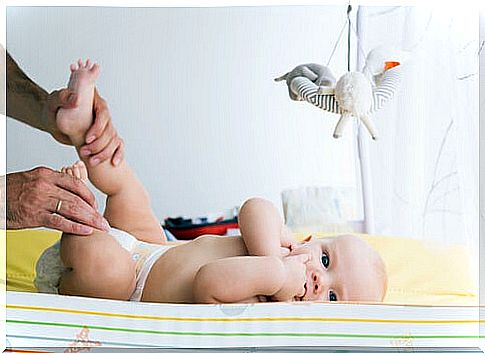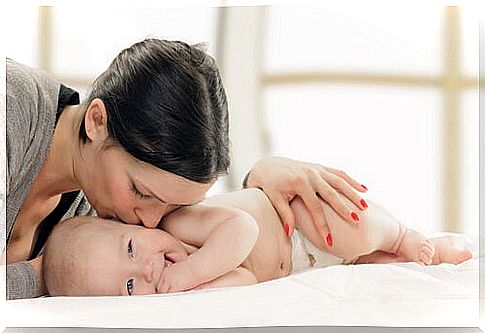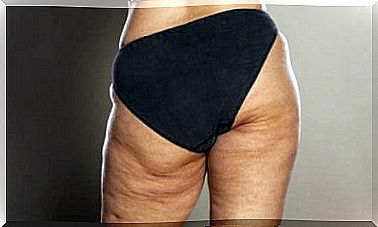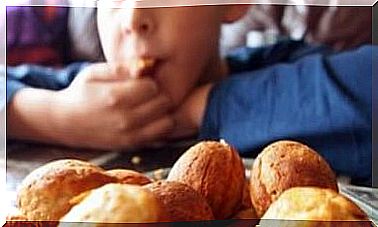Movement And Senses Develop In The Third Month Of Life

At the end of the first quarter the growth process continues. During the third month of the baby’s life, sight and hearing sharpen and his movements begin to be more intentional, although they are still not very coordinated.
As for the physical appearance, folds are formed on the arms and legs and the facial features begin to clearly define. For sure, by now you will have already fallen in love with her smile that shows itself every time the opportunity arises.
In this phase, which parents live with a lot of enthusiasm, the child’s growth is very rapid. The average weight is around 6.2 kilos and the height approaches 60 centimeters.
The little one pays close attention to what is happening around him, especially the sounds and music. This is a great time to start stimulating exercises. You can give him toys that play or light up (as long as they are not dangerous) so he can manipulate them. You can play some quiet music, or let him splash around and play while you bathe him.

Characteristics of the newborn
As we said before, in the third month of a newborn’s life some of his senses are fully developed, such as sight (which will reach its peak in the sixth month) and hearing. Unlike the first month and the second, he is already able to point, touch and take the objects that interest him.
Other typical changes in this phase are:
- The baby can pull his head up when lying on his stomach. The time he can keep his head up will increase.
- Sleep is more prolonged. During the night, he is able to sleep more without feeling the need to eat. If you have trouble falling asleep, you may be able to help by establishing habits that cause him to sleep at night. Taking a warm bath, dimming the lights, reading a story or talking are activities that can help you.
- The newborn makes more sounds than before. For the moment they are only vocalizations.
- It recognizes people and objects.
- It moves a lot. When lying down, he kicks a lot and is quite restless. If you support him, he tries to stand up (even if he still can’t).
Remember: these are guideline parameters that can vary from newborn to newborn.
The feeding in the third month of life of the newborn
Many mothers notice that, during the third month of life, infants take less milk than before, become distracted while breastfeeding or even cry. This, coupled with a slowdown in weight gain, leads them to think they are not eating enough.
Despite this, it is perfectly normal. First, the baby became more efficient when it came to milk. He ingests the same amount as before, but in a shorter time.
Plus, the distractions are understandable. The baby’s brain and senses develop quickly. For this reason, images or sounds can distract him.
Finally, if the mother seems to be producing less milk, it could be due to the fact that the mammary glands are now producing milk only when needed. Also for this reason, the breast not used during the feeding no longer drips.
However, this should not be interpreted as a disinterest in food on the part of the infant. The little one eats out of necessity, not out of duty. When he is hungry, he eats.
Go back to work
In many countries, maternity leave ends after 60 days, which corresponds to the child’s 8 weeks of life. This is a time when mothers experience mixed feelings.
On the one hand, there is the satisfaction of resuming the usual activities and returning to enter the world of work and social life. After the months spent looking after the newborn, returning to the work routine (which we always complain about) seems almost a vacation for some.

Of course, the opposite can also happen. Getting away for a while and putting things into perspective can help you review your current lifestyle and make the best choice for the future.
Mothers may also experience distress at having to leave the little one at home. They have grown accustomed to his presence and wonder if he will notice their absence and, above all, if he can bear it.
What can be done? Do you need to look for a babysitter? Can it be left to the grandparents? The truth is, there is no magic formula to answer these questions. The ideal is to think about it, talk to loved ones and try to understand what feelings emerge. The help of a professional, in these cases, can be useful. A piscotherapist or breastfeeding specialist can give you valuable advice.
The important thing is to look around while walking down the street and to know how to interpret your feelings and those of the baby. Once you can do this, you have to decide what is the best way to experience this phase with joy and happiness.









